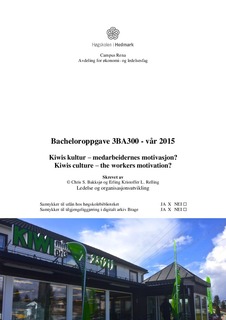| dc.contributor.author | Bakksjø, Chris S. | |
| dc.contributor.author | Relling, Erling Kristoffer L. | |
| dc.date.accessioned | 2015-06-25T12:21:23Z | |
| dc.date.available | 2015-06-25T12:21:23Z | |
| dc.date.issued | 2015 | |
| dc.identifier.uri | http://hdl.handle.net/11250/285712 | |
| dc.description.abstract | Denne oppgaven er resultatet av en treårig bachelorgrad i Ledelse og organisasjonsutvikling ved Høgskolen i Hedmark campus Rena. Oppgaven tar for seg temaet arbeidsmotivasjon, der problemstillingen er: ”Hvordan kan organisasjonskulturen i Kiwi hemme eller fremme arbeidsmotivasjon blant arbeidstakerne?”
Studiet er av kvalitativ art, et enkeltcasedesign med flere analyseenheter, der caset er dagligvarekjeden Kiwi Minipris. Vi har intervjuet fire informanter i Kiwi, som ble innhentet gjennom snøballmetoden, for å samle inn de nødvendige dataene, hvor bredden av informanter har vært ledere eller personer som jobber i administrative stillinger fra butikknivå og oppover i organisasjonen.
Relevant litteratur for området etter vår oppfatning er Bang (1995), Adams et al. (1976), Deci og Ryan (1990), Herzberg, Mausner og Snyderman (1959), Locke (2000), Schein (1985) og Schein (1982), men disse bøkene tar for seg temaene separate. Vi har ikke klart å finne litteratur som tar for seg om organisasjonskulturen kan påvirke arbeidsmotivasjonen, med unntak av bacheloroppgaven til Haugstveit (2007) som er det nærmeste vi finner.
I vår oppgave har vi kartlagt organisasjonskulturen i Kiwi, hva de ansatte ytrer at motiverer dem og ut ifra dette prøvd å finne koblinger mellom disse. Kulturperspektiver er i all hovedsak delt inn etter Scheins tre elementer: «Grunnleggende antagelser», «verdier og normer» og «artefakter». De motivasjonsteoriene vi har brukt hyppigst i analysefasen er Herzbergs «tofaktorteori» og Deci og Ryans «kognitiv evalueringsteori».
Etter å ha analysert dataene våre konkluderte vi med at verdiene «kjapt», «trygt», «billig», «stolthet», «en flat struktur» og «samfunnsansvar», den grunnleggende antagelsen om at alle Kiwiansatte jobber mot felles suksess, og artefaktene Kiwiskolen, Kiwisangen, administrerende direktør, SuperKiwiaden (og andre sosiale arrangementer) og bronsestatuen (en pris for å ha jobbet i Kiwi i 10 år) fremmer arbeidsmotivasjonen til arbeidstakerne. Videre konkluderer vi med at når kollegaer bryter respektive normer, når ledelsen bedriver micro-management og sviktende holdninger i forholdt til kommunikasjon har en svært hemmende virkning på arbeidsmotivasjonen.
Vi fant ut at verdier og normer muligens var den største påvirkningsfaktoren for arbeidsmotivasjon, og ikke artefaktene som vi i starten antok. Vi kom også frem til at organisasjonskulturen i høyeste grad kan påvirke arbeidsmotivasjonen, men som regel i indirekte grad der organisasjonskulturen aktiverer følelser som videre motiverer arbeidstakeren.
Området er lite forsket på, og vi mener det ville vært spennende hvis det ble iverksatt mer seriøs forskning, med tilgang til flere ressurser. | nb_NO |
| dc.description.abstract | This assignment is the result of Bachelor studies in management and organizational development at Hedmark University College, Campus Rena. This assignment explores the theme “work motivation”, and the main issue explored is: “How can the organizational culture of Kiwi enhance or inhibit work motivation amongst the employees?”
This study is qualitative, it is a singular case study of the supermarket chain Kiwi Minipris. We have interviewed four people, in administrative positons, in the chain from store level and upwards. These four were selected by the “Snowball method”.
Relevant literature, in our opinion, on the topic is: Bang (1995) Adams et al. (1976), Deci og Ryan (1990), Herzberg, Mausner og Snyderman (1959), Locke (2000), Schein (1985) and Schein (1982). These books raise the topics organizational culture and work motivation separately. The only literature we have been able to find on the topics as one is Haugstveit’s Bachelor assignment (2007).
In our assignment we have mapped the organization culture of Kiwi, what the employees claim motivates them and connections in between these. The cultural perspective is mainly divided in to three by using Scheins three elements; “basic assumptions”, values and norms” and “artefacts”. The main motivation theories used in the analysis are Herzbergs «two-factor theory» and Deci and Ryans «cognitive evaluation theory».
After analyzing our data we made the conclusion that the Kiwis values «quick», «safe», «cheap», «pride», “flat structure” and “social responsibility”, the assumption that all Kiwi employees work toward mutual success and the artefacts The Kiwi school, The Kiwi song, CEO, SuperKiwiaden (and other social happenings) and the Bronze statue (award for 10 year employment at Kiwi) enhance work motivation. Furthermore we concluded that when colleagues break norms, when the management micro manages, and when attitude towards communication fails, work motivation decreases.
Our findings were that values and norms, possibly, were the main issues that had impact on work motivation, not the artefacts as we initially assumed. We also found that organizational culture can largely increase work motivation, but mostly indirectly, through a culture which activates feelings that then motivate the employees.
This field has not been researched thoroughly; we think it would be interesting if this theme could be researched more thoroughly and with more resources. | en |
| dc.language.iso | nob | nb_NO |
| dc.subject | kiwi | nb_NO |
| dc.subject | motivasjon | nb_NO |
| dc.subject | arbeidsmotivasjon | nb_NO |
| dc.title | Kiwis kultur – medarbeidernes motivasjon? | nb_NO |
| dc.title.alternative | Kiwis culture – the workers motivation? | en |
| dc.type | Bachelor thesis | nb_NO |
| dc.subject.nsi | VDP::Social science: 200 | nb_NO |
| dc.source.pagenumber | 105 | nb_NO |
